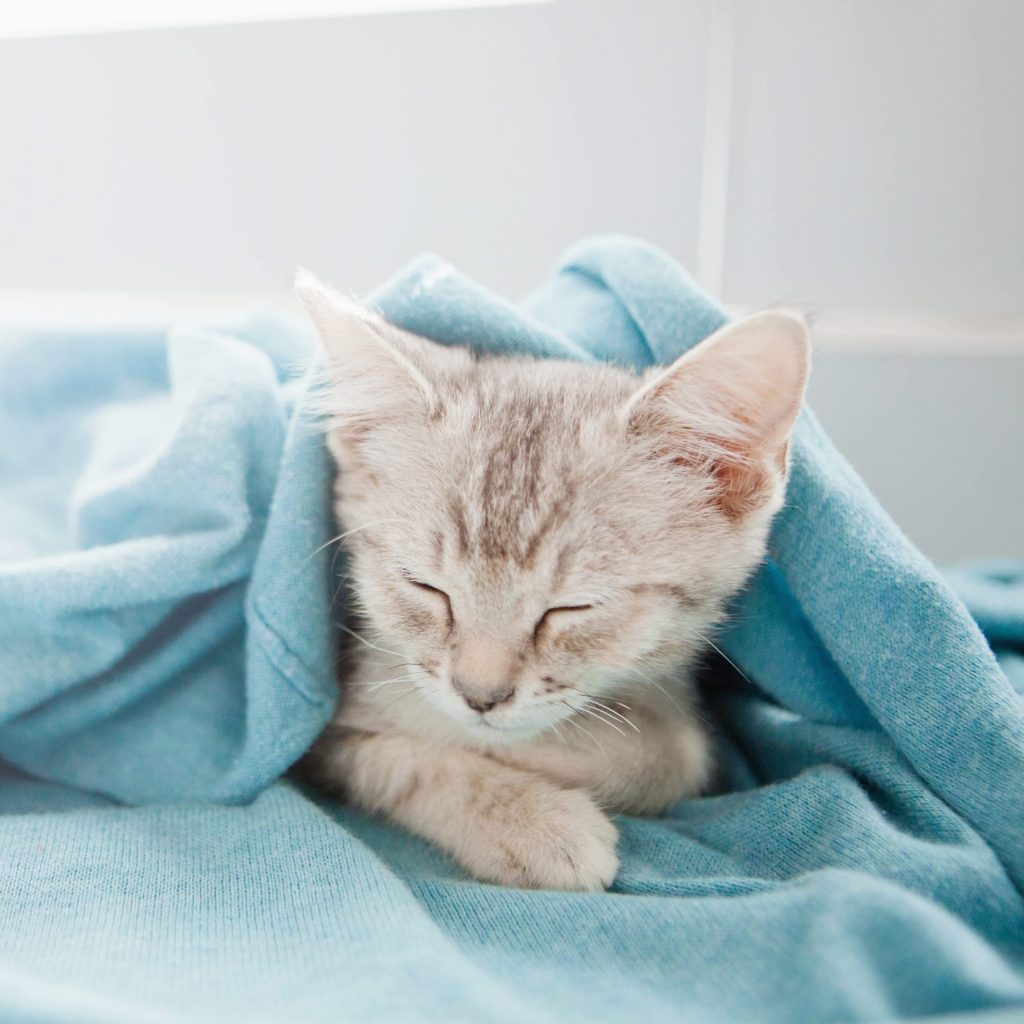From sitting in the bathtub to chewing on their owner’s hair, cats exhibit many strange behaviors that often leave humans scratching their heads. But there’s one behavior that absolutely melts even the toughest hearts – blanket sucking. Of course, pet owners that live with a blanket sucker may not find this all that cute. Although it’s typically a harmless behavior, it’s one that most cat owners find annoying, said Jessica Herman, DVM, adviser at Fuzzy Pet Health. But why do cats suck on blankets? POPSUGAR turned to the experts to discover the real meaning behind this feline behavior and ways to prevent (and distract) your sassy furball from blanket sucking.
Why Does My Cat Suck on Blankets?
There are a few reasons that cats suck on blankets. One likely reason is that they were weaned from their mother too early, said Mikel Delgado, PhD, a cat behavior researcher at the University of California at Davis School of Veterinary Medicine. Kittens typically stay with their mother until they are fully weaned, which happens around 3 months old.
The breed of the cat may also affect your kitty’s sucking habits, Delgado told POPSUGAR. This is because certain breeds, such as the Siamese, have a tendency to suck on blankets.
Cats may also suck on blankets and fabric in general because they’re repeatedly rewarded for the behavior, said Matthew McCarthy, DVM, owner of Juniper Valley Animal Hospital in Middle Village, NY. For example, “if your cat likes to snuggle with you and nibbles on your sweater or a nearby blanket a little while doing so, it’s kinda nice and you may reciprocate with some soft talk and rubs,” he said. A learned behavior such as this typically develops at a young age and often continues through a cat’s life with no problem.
Another reason cats may develop a blanket-sucking habit is because they have a medical condition, Dr. McCarthy said. Adult cats that suddenly develop blanket sucking with no apparent underlying trigger may have an underlying medical disorder. Such health problems are not always obvious and will require lab work, radiographs, and advanced diagnostics to reach a diagnosis, he said. Because of this, if such a behavior develops in your adult cat, you should consult your veterinarian as soon as possible.
The final reason has to do with stress or anxiety, Dr. McCarthy said. Indoor cats often do not have enough activities to keep them active and stimulated. As a result, some cats may choose to engage in blanket sucking as a way of easing their stress and anxiety, he said.
Should I Be Concerned About Blanket Sucking?
Most kittens outgrow this behavior around 10 to 12 months of age, as it’s when they reach social maturity, Dr. Herman said. That said, some cats may continue to exhibit this behavior with reduced intensity and frequency later on in life. You should consult your veterinarian if the behavior becomes excessive or destructive, she said.
This is because in some cases the behavior may intensify, affecting your cat’s normal daily activities like playing and eating, Dr. McCarthy said. In other instances, the behavior may transition from sucking on fabric to ingesting the fabric, which can lead to a life-threatening gastric or intestinal blockage.
How Can I Stop My Cat From Sucking on Blankets?
You should first notify your veterinarian about the behavior to confirm that there is no medical cause behind it, Delgado said.
If no medical disorder is found, Dr. Herman suggests limiting your cat’s access to the fabrics they like to suck on to stop blanket sucking. For example, “If your cat has a favorite blanket he or she sucks on, rid of the blanket,” she said. “If your cat only sucks on blankets on your bed, do not allow your cat access to your bedroom.” You should also never pet or engage with your cat when he or she is exhibiting the sucking behavior, since this may encourage the behavior. The key to eliminating blanket sucking is not encouraging or reinforcing the behavior, Dr. Herman said. She further stressed the importance of never punishing your cat for the sucking behavior because it can cause additional behavior problems.
Sometimes the behavior can be redirected by you providing your cat with other oral enrichment outlets too, Delgado said, referencing cat chew toys, cat grass, and food puzzles as healthy alternatives. Lastly, you should make sure that your cat’s environmental needs are met. Setting up the right environment for your kitty includes having several cozy spaces to rest, vertical space to climb, toys and playtime, scratching posts, clean litter boxes, and plenty of gentle attention from their humans, Delgado said.

